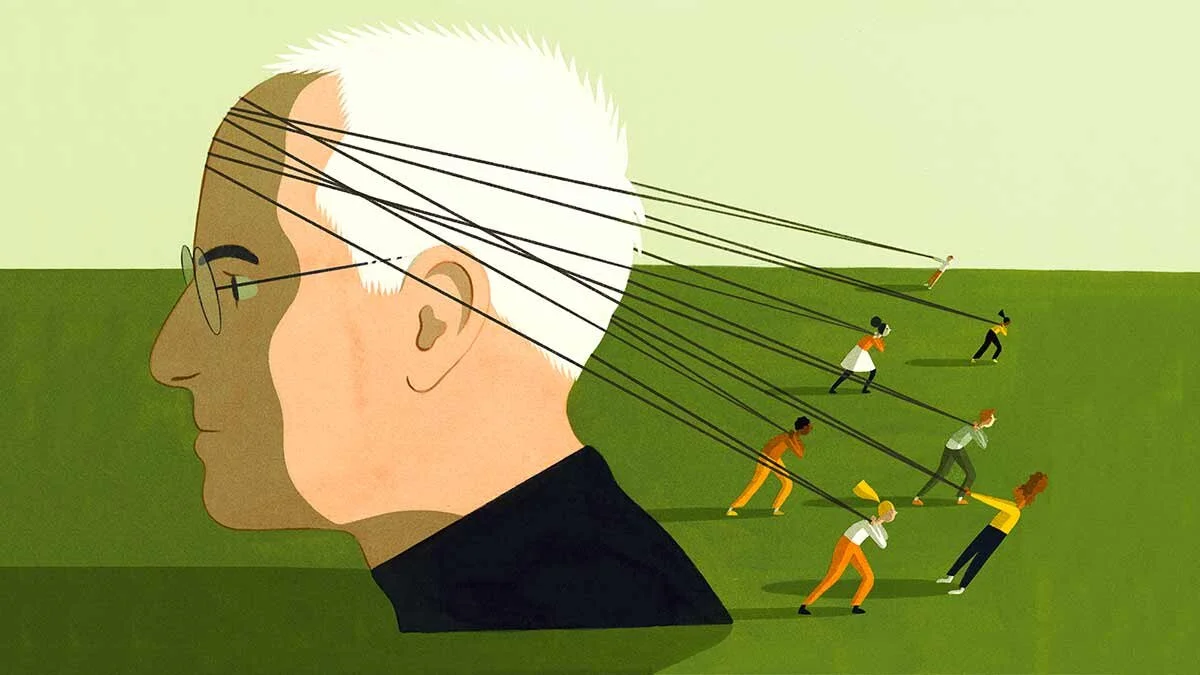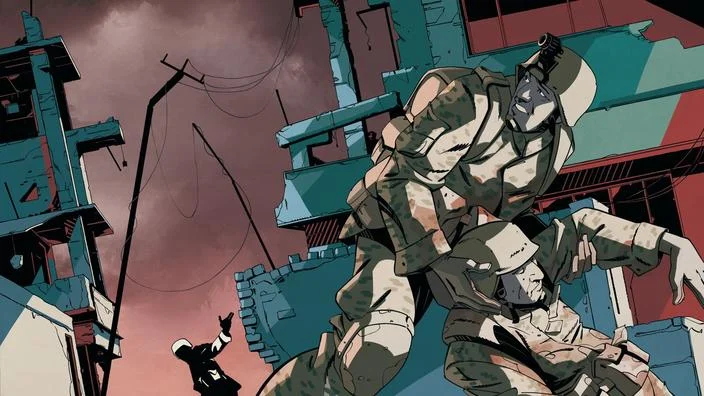“The drive to the weather station took nearly two hours — through snow-covered mountain passes, alongside waterfalls, past reindeer and empty summer houses. As we neared our destination, the road grew narrow and rough. Finally, we arrived at the end of an isolated fjord, where a small yellow lighthouse appeared in the distance.”
Read More“We live in an age of polarization. Many of us may be asking ourselves how, when people disagree with or discount us, we can persuade them to rethink their positions. The author, an organizational psychologist, has spent time with a number of people who succeeded in motivating the notoriously self-confident Steve Jobs to change his mind and has analyzed the science behind their techniques. Some leaders are so sure of themselves that they reject good opinions and ideas from others and refuse to abandon their own bad ones. But, he writes, “it is possible to get even the most overconfident, stubborn, narcissistic, and disagreeable people to open their minds.” He offers some approaches that can help you encourage a know-it-all to recognize when there’s something to be learned, a stubborn colleague to make a U-turn, a narcissist to show humility, and a disagreeable boss to agree with you.”
Read More“HuffPost spoke to nine children of QAnon believers in seven states, ranging in age from 19 to 46. Some are desperately trying to deradicalize their moms and dads — an agonizing process that can feel maddening, heartbreaking and futile. Others believe their parents are already too far gone and have given up trying to help them. A few have made the painful decision to cut off contact entirely, for the sake of their own mental health. (Unless otherwise noted, each person in this article is identified by a pseudonym to protect their family’s privacy.) All are sharing their stories in hopes of providing comfort to the myriad others experiencing the same heartache behind the scenes.”
Read More“One of the best explanations for the triumph of a “solution shop” like McKinsey was co-written by the late Clayton Christensen of Harvard Business School in 2013. When hiring a management-consulting firm, he said, clients do not know what they are getting in advance, because they are looking for knowledge that they themselves lack. They cannot measure the results, either, because outside factors, such as the quality of execution, influence the outcome of the consultant’s recommendations.”
Read More“Infarm has shipped over a thousand of its “farms” to shops and chefs across Europe (and a few in the US). These units, which look like jumbo vending machines, grow fresh greens and herbs in rows of trays fed by nutrient-rich water and lit by banks of tiny LEDs, each of which is more than ten times brighter than the regular bulb you’d find in your dining room. Shoppers pick the plants straight from the shelf where they’re growing.”
Read More“There is no consistency out there in the world of marketing to delineate between brand plans and marketing plans. Many younger marketers assume there are fixed rules, to which they are currently not a party, that nut all of this out in gratuitous detail. Trust me, no such guidelines exist. The practical reality of planning is that marketing plans and brand plans usually mean the same thing. The title you use comes down to the brand architecture of your company and not some hard-and-fast procedural rulebook.”
Read More“Gruesome stories such as these are hardly unique to New York City. In October 2019, a building that was to be a new Hard Rock Hotel in New Orleans collapsed while under construction, killing three workers and injuring dozens more. Two of the bodies were so thoroughly trapped inside the unstable wreckage that officials initially deemed them impossible to retrieve. A tarp was strung up to shield the bodies from view. Months later, high winds loosened the makeshift shroud, revealing to passersby on the streets of the French Quarter the decaying cadaver of one of the two men still entombed in the site. The bodies were finally retrieved in August, 10 months after the collapse.”
Read More“Right now, in corporations around the globe, working-group committees are focusing in hard on one of those ‘positive unintended consequences’. The problem these squads have been tasked with solving is how and in what order to get people back to the office. That has forced them to confront a tricky question: once the pandemic is over, what makes working at the office superior to working from home?”
Read More“Convenience is the most underestimated and least understood force in the world today. As a driver of human decisions, it may not offer the illicit thrill of Freud’s unconscious sexual desires or the mathematical elegance of the economist’s incentives. Convenience is boring. But boring is not the same thing as trivial.”
Read More“Unless you work in finance, you probably haven’t heard of CLOs, but according to many estimates, the CLO market is bigger than the subprime-mortgage CDO market was in its heyday. The Bank for International Settlements, which helps central banks pursue financial stability, has estimated the overall size of the CDO market in 2007 at $640 billion; it estimated the overall size of the CLO market in 2018 at $750 billion. More than $130 billion worth of CLOs have been created since then, some even in recent months. Just as easy mortgages fueled economic growth in the 2000s, cheap corporate debt has done so in the past decade, and many companies have binged on it.”
Read More“In repressive states, the dark Web has become a haven for political activists. Many journalists use Tor to send and receive information securely, or to communicate with sources. Some users like the fact that dark-Web pages are not subject to the same censorship as the regular Web, where there are limits on what you can say. Other users appreciate Tor because they can avoid offering up their private data to such giant corporations as Google and Facebook. Some legitimate news outlets, including the Times and ProPublica, maintain onion-router pages.”
Read More“Researchers call these design and wording decisions “dark patterns,” a term applied to UX that tries to manipulate your choices. When Instagram repeatedly nags you to “please turn on notifications,” and doesn’t present an option to decline? That’s a dark pattern. When LinkedIn shows you part of an InMail message in your email, but forces you to visit the platform to read more? Also a dark pattern. When Facebook redirects you to “log out” when you try to deactivate or delete your account? That’s a dark pattern too.”
Read More“As anyone who has been called out for hypocrisy by a small child knows, kids are exquisitely attuned to gaps between what grown-ups say and what grown-ups do. If you survey American parents about what they want for their kids, more than 90 percent say one of their top priorities is that their children be caring. This makes sense: Kindness and concern for others are held as moral virtues in nearly every society and every major religion. But when you ask children what their parents want for them, 81 percent say their parents value achievement and happiness over caring.”
Read More“Unexpected events or shocks disrupt our habitual routines, jolt us out of our comfort zones, and lead us to ask big questions about what matters and what is worth doing. It’s no wonder, then, that during the current pandemic, many people are rethinking their careers.”
Read More“Purpose isn’t magic — it’s something we must consciously pursue and create. With the right approach, almost any job can be meaningful.”
Read More“We’ve lived through a decade of conference bullshit about reducing the duopoly’s grip on the digital advertising dollar through new ‘hard-hitting’ government policies or worthy (very temporary) advertiser bans. Both Google and Facebook have pretended to listen and learn but have actually just charged on regardless, with barely a blip in the respective EBITDAs. There was never any real potential to derail these two spectacular companies. If anything, the threat of sanction helped both platforms appear to be challenged when nothing could have been further from the truth.”
Read More“That may be one of the reasons a number of projects are now backing away from spare-no-expense opulence and instead offering a more understated take on luxury. A handful of recently introduced buildings have handsome interiors with visually calm wood, stone, brick and tile that don’t cry out for attention. New model units are now furnished to appear more attainable than wildly aspirational. And some existing buildings are playing up the practical livability of their remaining units.”
Read More"Selling drugs is a relationship business. It’s best to do it in person. That is why, on a summer evening in 2012, Alec Burlakoff was out for dinner with Steven Chun, the owner of Sarasota Pain Associates. Burlakoff was a sales manager for Insys Therapeutics, an Arizona-based pharmaceutical company with only one branded product, a new and highly potent opioid painkiller called Subsys. Chun was a doctor who prescribed a lot of opioids."
Read More"The reason it’s a band of brothers, and not a band of friends, is because you can fight all day long with your brother and still be willing to die for him. J. wasn’t the only misfit in Decaul’s unit. Decaul’s roommate was heavy into alcohol and hard drugs. “We used to get into fights all the time,” Decaul told me. “I’m talking about fistfights.” But the roommate’s peers didn’t get rid of him either, because out in the field the guy worked miracles on artillery pieces. The drug addict and the Klansman—both of whom should have been kicked out—were seen by their fellow marines as contributing members of the unit, useful to the task at hand."
Read More"With in-house innovation and marketing departments, most chains don’t need restaurant consultants. Still, clients came to us with dozens of problems. Some had an idea for a new product line (breakfast tacos, seasonal smoothies) that they wished to benchmark against a new set of palates. Some wanted to break into office catering but didn’t know where to begin. Some weren’t even technically restaurants, such as the pay-by-the-hour workspace that wanted to keep customers on the premises. Still others hired us as a last resort. These were the chains circling the drain, bordering on irrelevance, caught in the throes of an identity crisis. We called this kind of project a “concept revitalization.”"
Read More


















